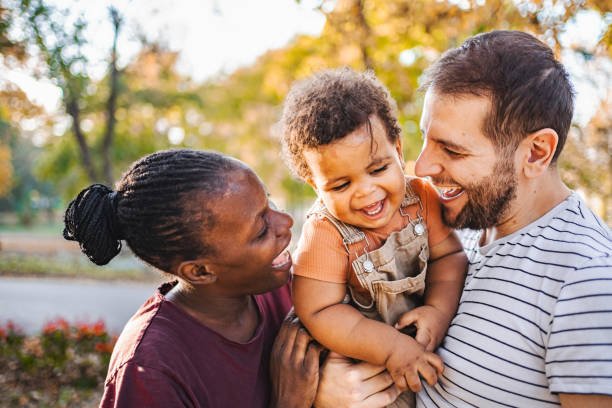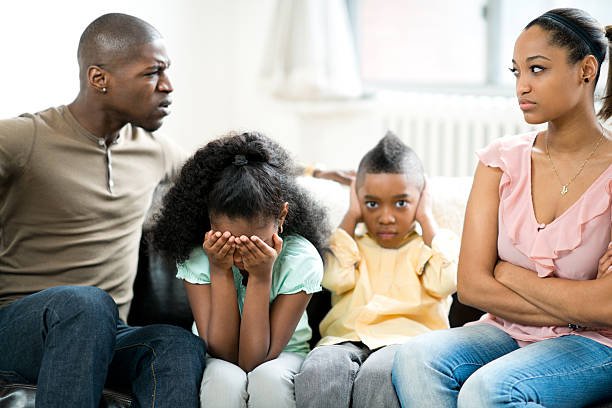The Cycle of Broken Love: How Toxic Parental Relationships Shape Their Children’s Future

The home is the first place where a child learns about love, respect, and relationships. When parents treat each other with kindness and respect, their children grow up to emulate it with a healthy understanding of love. But when a home is filled with abuse, infidelity, and disrespect, children often carry these toxic patterns into their own relationships. A child who grows up watching violence, verbal abuse, and betrayal between parents may unknowingly or unconsciously repeat these same habits in adulthood. Without intervention, a cycle of broken love continues from one generation to the next.

In many dysfunctional families, the parents' relationship is filled with hostility and chaos. The father insults the mother, calling her names like "oloriburuku iya" meaning “useless woman,” “prostitute,” or “good-for-nothing.” The mother retaliates by calling him “a failure,” “a useless man,” or “an animal.” Their words cut deep, not only hurting each other but also damaging the minds of their children, who grow up believing that love comes with insults and disrespect.
Physical abuse is also common in such homes. Some families live like tenants in the same room, cooking differently. Some share their children to love one parent and hate tha other. They turn their children against themselves. A man who regularly beats his wife in front of the children teaches his sons that violence is a way to control a woman, and his daughters that being beaten is part of marriage. In the same vein, when a wife denies her husband his marital rights out of anger, she unknowingly teaches her daughters that withholding affection is a weapon, and her sons may grow up expecting similar treatment from their wives.
Infidelity further poisons the home of many families. A husband who openly brings other women into the house and sleeps with them on the matrimonial bed not only disrespects his wife but also sends a dangerous message to his children. His sons may believe that cheating is a normal part of being a man, while his daughters may accept that being disrespected by a man is inevitable. A wife who also engages in extramarital affairs may encourage her daughters to do the same, creating a generational cycle of unfaithfulness to their children.
Beyond abuse and infidelity, many toxic parents neglect their responsibilities, which further damage their children's future. A father who refuses to send his children to school because his own parents did not educate him does not just deny them an education, but teaches them to repeat the cycle of ignorance and poverty. Instead of breaking the chain, he strengthens it. His children, seeing no value in education, may grow up to do the same with their own children.
Meanwhile, neighbors often have to intervene when fights between the parents become too violent. The children grow up watching this film of their parents being separated by outsiders, learning that relationships are full of fights and that violence is normal. This unhealthy environment conditions them to expect and tolerate abuse in their own marriages.
As these children grow older, they begin to exhibit the behaviors they have witnessed at home. A boy who watched his father insult, cheat on, and beat his mother is likely to repeat those same actions in his own marriage. He may see women as inferior and believe that violence is the only way to maintain peace.

A girl who grew up watching her mother insult her father and engage in extramarital affairs may see such behavior as normal. She may not respect her husband and may also turn to infidelity when faced with difficulties in her marriage. Having learned that marriage is a battlefield rather than a partnership, she might replicate the constant fights and insults she grew up witnessing. It's rampant nowadays when none of the children belong to the father through DNA Test.
Even when children promise themselves that they will never be like their parents, they often find themselves falling into the same habits. This is because human beings are shaped by what they experience during their formative years. Without conscious effort and intervention, the cycle continues.
Breaking free from these toxic patterns requires awareness and intentional effort. Children from abusive homes must recognize that what they grew up seeing is not normal or healthy. They must actively seek better role models, whether through positive relationships, mentorship, or counseling.
Education, self-reflection, and therapy can help individuals unlearn harmful behaviors and build healthier relationships. Men can learn to express emotions without resorting to violence. Women can learn to communicate without insults or manipulation. Couples can learn to treat each other with respect, even in disagreements.
It’s not always easy to break away from what we grew up seeing, but I made up my mind not to follow what I saw between my parents and grandparents. My choice proves that change is possible and i build the kind of relationship I truly deserve. My parents always fight, my Mom gave him a mark on his face till he died. My grandfather married four wives forty children, of which my grandmother was the first wife. She gave birth to twelve children. He married other ones, all gave birth to children, males and females. No education, no work. Some refused to attend school while some tried but couldn't finish. Ask me what happened now. The man died, all the wives died. My grandmother's children remain two. The second wife none remains. The third wife, three remain while the last wife none remains. I begin to ponder and imagine how they ended their lives. Quarrelling and fighting everyday. Attacking themselves both physically and spiritually. I then vowed that I will never be a second wife, I will never fight my husband. I will not have a broken home. This is my choice.
Conclusion
Parents play a critical role in shaping their children's future relationships. A toxic home filled with abuse, infidelity, and neglect creates a new generation of broken marriages. But the cycle can be broken. By recognizing the damage of past experiences and making a conscious choice to do better, individuals can create healthier, more loving relationships. Love should not be a cycle of pain, it should be a foundation of trust, respect, and growth.
Thanks for reading my weekly prompt.
Images are from Pixabay.com

Hello.
There is reasonable evidence that this article is machine-generated.
We would appreciate it if you could avoid publishing AI-generated content (full or partial texts, art, etc.).
Thank you.
Guide: AI-Generated Content = Not Original Content
Hive Guide: Hive 101
If you believe this comment is in error, please contact us in #appeals in Discord